TURKEY
Society

Society
Cities in TURKEY
| Akyarlar | Alanya | Ankara |
| Antalya | Beldibi | Belek |
| Bodrum | Colakli | Fethiye |
| Gumbet | Içmeler | Istanbul |
| Kemer | Konakli | Kumkoy |
| Kusadasi | Lara | Marmaris |
| Side |
Society
State organization
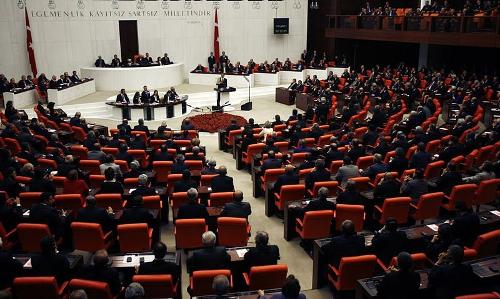 Grand National Assembly of TurkeyPhoto: Voice of America in the public domain
Grand National Assembly of TurkeyPhoto: Voice of America in the public domain
According to the Nov. 1982 Constitution approved by referendum (amended in 1995), the president is elected by parliament for a seven-year term, appoints ministers and judges, and is also head of the influential National Security Council. The constitution provides for a single chamber, the National Assembly, consisting of 550 members, with universal suffrage elected for a term of five years. Political parties that support communism, fascism or religious fundamentalism are prohibited, as are the Kurdish parties PKK and DEP.
Administrative division
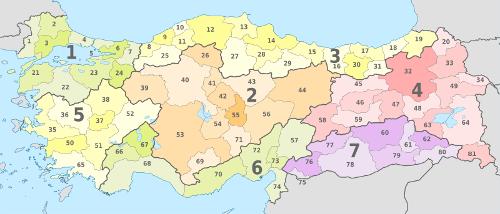 Map of administrative divisions of TurkeyPhoto: TUBS CC 3.0 Unported no changes made
Map of administrative divisions of TurkeyPhoto: TUBS CC 3.0 Unported no changes made
Turkey is divided into 81 provinces (iller), administered by a governor appointed by the government. The provinces are divided into 838 districts and are headed by a governor. There are 187 cities and over 36,000 villages (ruled by a muhtar, a village chief elected by the village assembly). The cities are divided into mahalleler (neighborhoods).
Social situation
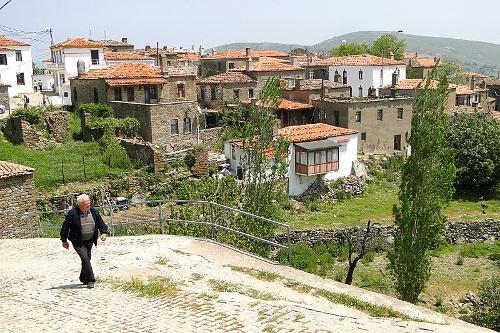 Village scene TurkeyPhoto: Adam Jones CC 2.0 Generic no changes made
Village scene TurkeyPhoto: Adam Jones CC 2.0 Generic no changes made
The social relations in the Turkish countryside, especially in the underdeveloped East, are mainly determined by Islam and tradition. The family often still functions as a production and consumption unit, that is to say, it grows its own products for its own use. A large part of the urban population consists of people who were born in the countryside. The male and female world are often strictly separated and dowry is still very common in marriages. In village society, the imam (the predecessor in prayer) and the aga (chief, large landowner) often play a major role. In the context of prevailing relationships, the aga often plays a role as a link between the village and central government. Increasing migration (to cities and abroad) is changing this pattern. In cities such as Ankara and Istanbul, about 25% of the population lives in the slums. The registered unemployment rate in 1995 was 10%, but it is certain that the actual unemployment rate is around 20%. In addition, there is quite a bit of hidden unemployment and Turkey has many street vendors and other marginal professions.
Education
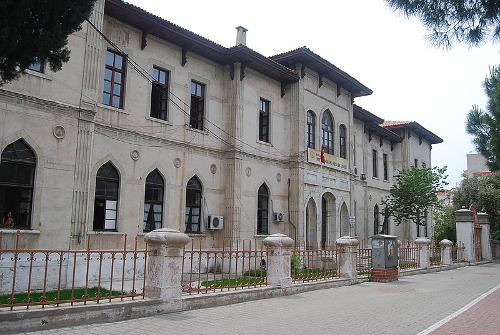 Old School Mugla TurkeyPhoto: Janlight in the public domain
Old School Mugla TurkeyPhoto: Janlight in the public domain
Education has been a matter for the state since 1923, although Koran schools also exist. Illiteracy is approximately 20%, but is higher in rural areas and among women. Education is compulsory for up to 14 years, education is free up to and including university. Actual school attendance is not general, especially in rural areas in the east and among older girls. In rural areas, there is a shortage of teaching materials and a lack of teachers. After five years of primary education, you can go to a middle school and a lycée of three years each, which are completed with state exams. There are more than 200 universities (the largest in Istanbul, Ankara, Izmir, Erzurum and Trabzon). There are over 400 higher vocational schools and about 1,600 technical vocational training courses. About 30,000 Turks with wealthy parents study abroad, often in Germany. To combat illiteracy, reading rooms and libraries have been established all over the country, which also provide reading and writing courses for adults.
Politics
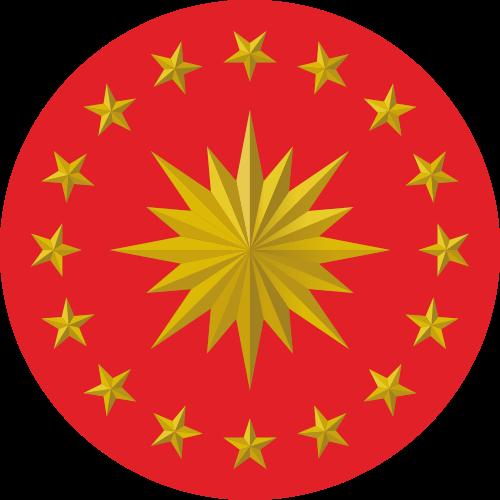 Presidential seal TurkeyPhoto: Public domain
Presidential seal TurkeyPhoto: Public domain
After the coup d'état of Sept. 1980 the political parties were dissolved. New political parties were admitted in the 1983 elections, approved by the National Security Council. Former politicians were barred from political activity until 1987. In practice, a number of old political parties returned under a new name. The main parties where: the Anavatan Partisi (ANAP) or Motherland Party; the Dogru Yol Partisi (DYP) or Party of the Right Path, the Sosyal Demokratik Halkçi Parti or Social Democratic Populist Party, the Party of the Democratic Left. In the Refah Partisi or Prosperity Party are the National Salvation Party of Necmettin Erbakan (traditionalist Islamic) and the National Action Party of Alparslan Türkes; the battle group of the 'Grey Wolves' was connected to this. There are also the Milliyetçi Demokrasi Partisi or Party of Nationalist Democracy (pushed forward by the army after 1980) and the Halkin Emek Partisi or Workers' Party of the People, with mostly Kurdish members.
The 1982 constitution recognizes the right to unionize and the right to strike, but imposes strict restrictions on the activities of the union organizations, especially in the political field. The largest umbrella trade union is Türk-is (Confederation of Turkish Trade Unions), founded in 1952 and a member of the International Federation of Trade Unions. The main Turkish employers are united in TUSIAD (Turkish Association of Industrialists and Businessmen).
The current political situation is described in the chapter history.
Sources
Brosnahan, T. / Turkey
Lonely Planet
Graven, R. van den / Reishandboek Turkije
Elmar
Te gast in Turkije
Informatie Verre Reizen
Turkije
Het Spectrum
CIA - World Factbook
BBC - Country Profiles
Copyright: Team The World of Info